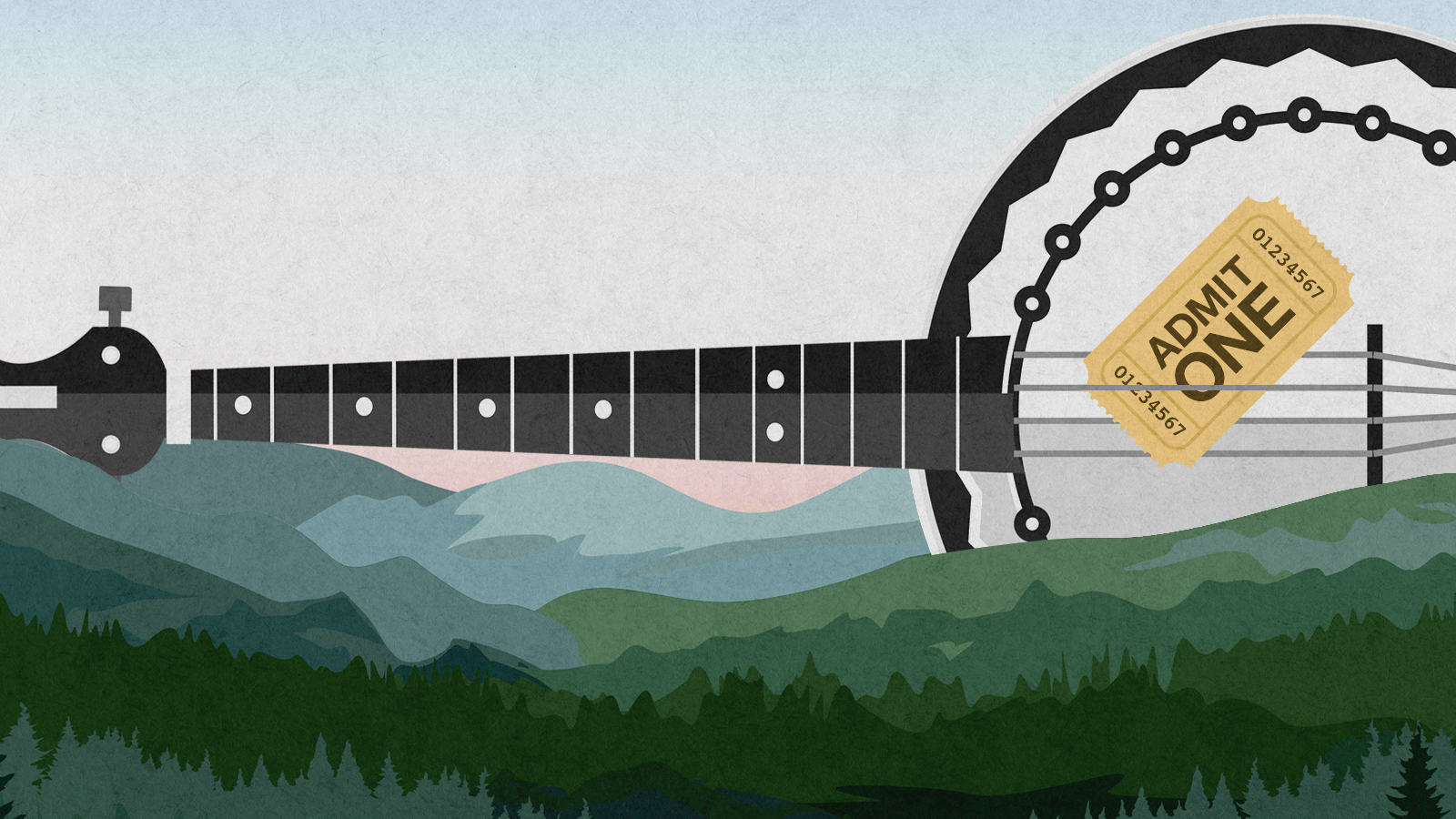Why Americana festivals are the best bang for a music lovers' buck
Skip the $200 stadium concert tickets for a weekend with friends, family, and fiddles


A free daily email with the biggest news stories of the day – and the best features from TheWeek.com
You are now subscribed
Your newsletter sign-up was successful
After two summers of spotty (at best) opportunities to see live music in large venues, 2022 promises plenty of opportunities for fans to find post-COVID grooves. But surging gas prices and other hiccups in the economy may temper your ability to cure cabin fever. How can savvy concertgoers find value for their entertainment budgets?
My suggestion: Go to a bluegrass or Americana festival. Hundreds are scheduled across the U.S. and Canada through October. Along with stellar musicianship in a welcoming atmosphere, such festivals highlighting what blind guitar-picking legend Doc Watson called "traditional-plus" music are fun — and amazing bargains. Rather than seeing a handful of artists piecemeal over the next few months, you could find an enticing location and build your summer vacation around an event. Admission prices are often lower than the fee to enter a theme park. And there are no lines, except maybe at the food and merchandise tents.
Americana is an umbrella term for the music from the myriad global cultures that have migrated to our continent and marinated on it. The sounds may have originated with enslaved Africans, miners from the British Isles, or laborers from Europe and the Caribbean islands. It includes bluegrass and hillbilly songs, of course, but it also incorporates strains of Celtic, Cajun, blues, polka, gospel, reggae, and — yes — rock and roll. Bluegrass founder Bill Monroe may have considered music with electric instruments and percussion "no part of nothin'"; Americana has no such restrictions.
The Week
Escape your echo chamber. Get the facts behind the news, plus analysis from multiple perspectives.

Sign up for The Week's Free Newsletters
From our morning news briefing to a weekly Good News Newsletter, get the best of The Week delivered directly to your inbox.
From our morning news briefing to a weekly Good News Newsletter, get the best of The Week delivered directly to your inbox.
Festivals come in all sizes and settings. A handful feature only traditional bluegrass and old-timey string bands, while most embrace the eclecticism of the larger genres forms. The huge ones — Nashville's Bonnaroo and the New Orleans Jazz & Heritage Festival — can last more than a week and feature household names, including Jimmy Buffett, The Chicks, Chris Stapleton, and Stevie Nicks. The smaller ones — such as the inaugural That Music Fest at the Durham Bulls Athletic Park in North Carolina — might span a mere couple of days and highlight artists with local connections (Mountain Goats and Steep Canyon Rangers, for instance).
Some festivals evolved almost spontaneously from one-time events. Many venerable festivals arose in remote locations where a campsite is easier to get than a hotel room. Others emerged in small towns or cities, with the sorts of amenities you'd expect wherever you normally travel.
But even if you wind up in a campground seemingly in the middle of nowhere, at a bluegrass/Americana festival, you'll hear fantastic music and find common ground with new friends.
Merlefest, which runs from April 28 to May 1, marks the unofficial launch of the outdoor festival season. It's in my hometown, Wilkesboro, North Carolina, and began in 1988 as a fundraising concert to build horticultural gardens on the campus of Wilkes Community College in the Blue Ridge Mountain foothills. Doc Watson, who lived nearby, agreed to play at the show if the campus built a garden for the sight-impaired named for his late son and longtime musical partner Eddy Merle Watson.
A free daily email with the biggest news stories of the day – and the best features from TheWeek.com
By the time the show was scheduled, Doc had invited a "few friends" to honor Merle. More than 50 stars of bluegrass and traditional music insisted on paying tribute and, on the fly, college officials pulled together a two-day festival. Its "main stage" was a flatbed truck parked in a river bottom, with patrons sitting on hay bales and blankets.
Today, Merlefest covers four days, with more than 100 artists performing on a dozen stages across the 150-acre campus. Even though Doc is gone (he performed several times during each edition of Merlefest until his death in 2012, a few days before his 89th birthday), Merlefest keeps thriving, drawing up to 80,000 music-lovers a year. This year's festival marks the Merlefest debut of the hottest progressive/jam band on the circuit, Greensky Bluegrass, plus the return of Emmylou Harris, the Nitty Gritty Dirt Band, and a group Doc Watson invited to play Merlefest in 2000 after hearing them busk for tips on the streets of Boone, North Carolina: Old Crow Medicine Show.
Why choose an Americana festival over other music options? A few reasons:
Stellar, surprising performances
This is straight-up, live music from world-class performers. You're likely to see Grammy winners, members of the Grand Ole Opry, the Country Music and Rock and Roll Halls of Fame, and the Hollywood Walk of Fame, as well as emerging artists awaiting discovery.
You'll also experience unexpected collaborations. At Merlefest, Sam Bush is likely to play mandolin, fiddle, or guitar at a dozen sets, unannounced. Emmylou Harris will add her heavenly voice to other bands' performances. And there's no telling how many stars will make a cameo appearance with The Nitty Gritty Dirt Band. (In 2007, Led Zeppelin's John Paul Jones joined Doc Watson and Earl Scruggs with the group on stage.) Pro tip: Look for sets listing a band "and friends." Pleasant surprises await.
Bring the family
Check first, but Americana festivals generally welcome all ages. At Merlefest, anyone 12 or younger accompanied by an adult gets in free. Also, alcohol and tobacco aren't allowed. There's a Little Pickers Stage for kids under 18 to show their chops and host special performances for youngsters. Most festivals have magic acts, climbing walls, playgrounds, face-painting, craft exhibits, and other activities for kids and their parents — along with changing stations and shaded areas for families to chill.
Pack your axe
Look for festivals offering open jams and workshops. If you play just a little, or want to learn, you can sit in with some fine pickers and teachers and become more than a passive consumer of the music. If you don't play, lurkers are welcome. Enjoy the magic that takes place when a group of strangers mesh around the rhythm and melody of a familiar tune.
Fellowship
Americana festivals are fun, friendly places. Whether you're eating dinner at a communal table in a food tent, arranging camp chairs near a stage, or wandering through the merchandise area, you'll strike up a conversation with folks who share your interests in the music and the culture. You'll find festival regulars, some reserving the same campsites and building their own neighborhoods for a few days each year. (They'll have the lowdown on the best dining and shopping in the area, too.) Countless friendships are started and renewed at festivals, nurtured on social media fan groups.
Value
Aside from the music, you get a lot for your festival dollars. A one-day pass typically lets you into every show that day. For a flat price, you can see dozens of acts for not much more than you'd pay to hear one artist at a single performance. If you're a fan of the freewheeling Old Crow Medicine Show, you could pay $45 to $75 to see them play a separate concert. Or you could pay $90 to see their set on April 30 headlining Merlefest — and you could choose among more than 60 other performances during the 12 hours the grounds are open that day. If you wander into a show that's not your style, just wander to another one you prefer.
If you love live music, there's nothing more nurturing and invigorating than spending a few days listening to great performances at an Americana festival. You, family, and friends can go off the grid, enjoy the fresh air and sunshine, and hang out with several hundred or a few thousand of your new best friends.
See you at the late-night jam!
Rick Henderson is an award-winning writer and editor whose work has appeared in The New York Times, USA Today, the Los Angeles Times, Reason, The Dispatch, and many other publications. He and his family live in North Carolina. He's also the social director of the Raleigh Uke Jam.
-
 Local elections 2026: where are they and who is expected to win?
Local elections 2026: where are they and who is expected to win?The Explainer Labour is braced for heavy losses and U-turn on postponing some council elections hasn’t helped the party’s prospects
-
 6 of the world’s most accessible destinations
6 of the world’s most accessible destinationsThe Week Recommends Experience all of Berlin, Singapore and Sydney
-
 How the FCC’s ‘equal time’ rule works
How the FCC’s ‘equal time’ rule worksIn the Spotlight The law is at the heart of the Colbert-CBS conflict
